Am I fully vaccinated for polio? How to check your Michigan immunization record.
Poliovirus paralyzed a Rockland County, New York, man this summer and has been detected in the wastewater in a growing number of counties in southern New York, raising concerns that the virus — once thought eradicated in the U.S. — is spreading again among unvaccinated people.
Public health officials say it’s vital to be sure you and your children are up to date on all recommended vaccines, including polio.
“We're on alert in the public health and medical communities,” said Dr. Matthew Boulton, senior associate dean for global public health at the University of Michigan. “What's important is that we try, of course, to limit any further transmission of polio in this country, and the best way to do that is through vaccination.
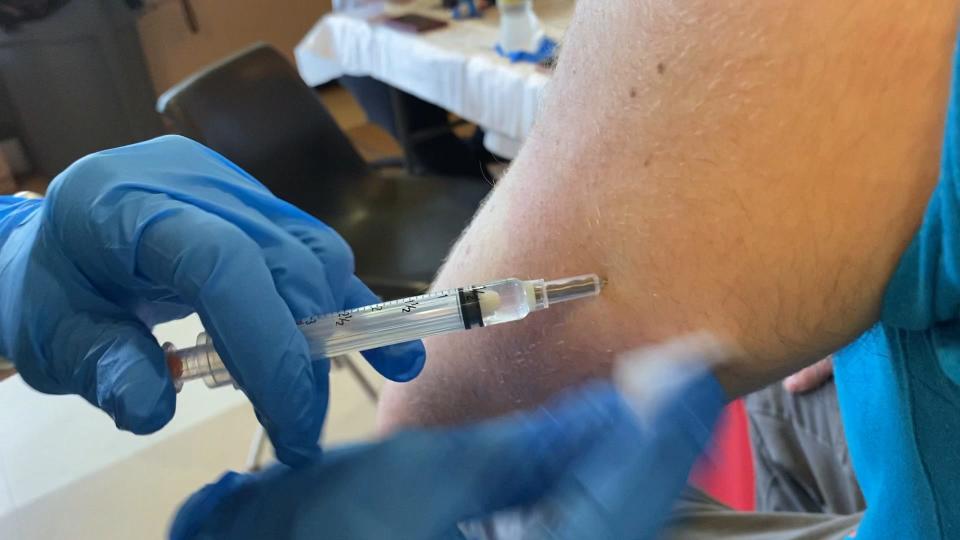
But many may be wondering: Was I fully vaccinated for polio when I was young? How can I find a record of my childhood immunizations? Will my 50-year-old polio vaccines still protect me in an outbreak? What about vaccines for other diseases?
The Free Press asked the experts for answers to these questions and more.
How can I find a record of my immunizations?
The answer depends on when and where you were born.
If you were born after Dec. 31, 1993, odds are good that you’ll find a pretty complete accounting of all the vaccinations you’ve gotten since infancy in the Michigan Care Improvement Registry, better known as MCIR.
The registry was launched in 1998 with a goal of collecting Michigan childhood immunization records digitally in one place that could be easily accessed by medical providers and schools, licensed child care providers and pharmacies. Health care providers are required to report childhood immunizations to the MCIR within 72 hours of administering a dose of vaccine.
More:Michigan health leaders on 'high alert' for polio as vaccination rates continue to fall
More:Michigan universities prep for threat of on-campus monkeypox outbreaks
“So if that child moves around, different providers can utilize that information to immediately access when and what vaccines that child has received, and it is a valuable source of information for the parents and for the immunized person themselves because it keeps a permanent record of their immunizations,” said Boulton, who also is a U-M professor of epidemiology, preventive medicine, and health management and policy.
Starting in June 2006, a change to the state public health code allowed adult immunization records to also be added to the MCIR.
Anyone age 18 or older can access their records in MCIR for free online through the Michigan Immunization Portal: https://mdhhsmiimmsportal.state.mi.us.
What if the MCIR doesn’t have my records? What should I do?
Health care providers are continuing to add historical immunization data to MCIR, but if you were born prior to Dec. 31, 1993, or didn’t grow up in Michigan, MCIR may well not be of help, said Dr. Delicia Pruitt, a family physician and associate professor at Central Michigan University College of Medicine.
You might have to do a bit more legwork to track it down, said Pruitt, who also is medical director of the Saginaw County Health Department.
If your parents are still living, ask whether they remember having you vaccinated as a child. If your parents don’t remember or if they’re no longer living, Pruitt said it’s a good idea to check with the local health department in the county where you lived as a child.
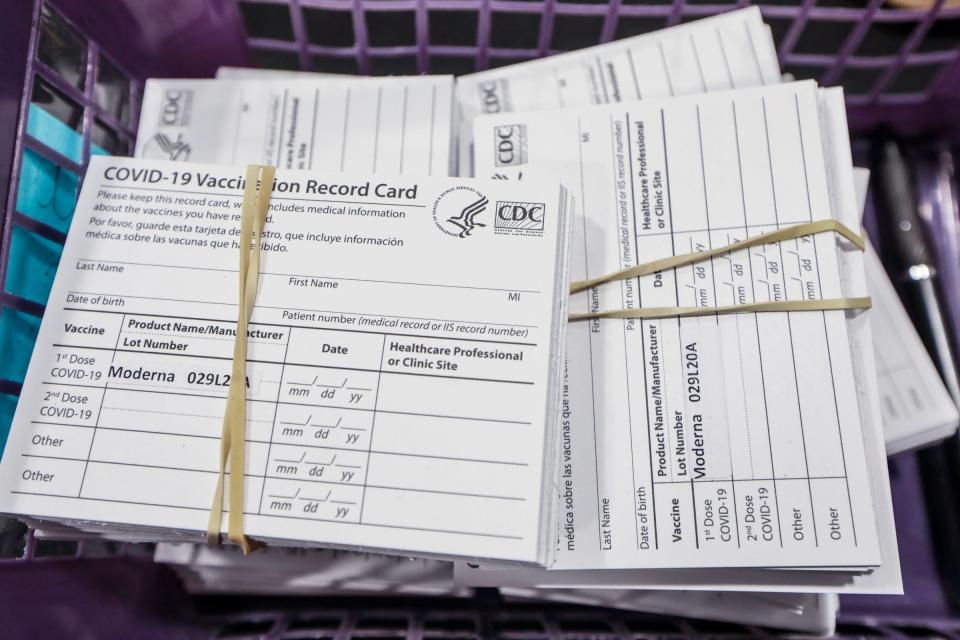
“Call your local health department or even … go visit the local health department and actually talk to someone and see if they have a copy of the record,” she said.
If that doesn’t work, check with the school district or college you attended to find out whether they’ve got a historical record of your immunizations. Most schools require vaccination records to enroll.
“We used to have a handwritten copy that we would take to college or we had to send a copy of that to college,” Pruitt said. “So some educational places may have that available, too.”
My parents aren’t living. No agency has my records. What should I do now?
If you were born in the post-World War II era, Boulton said uptake of the polio vaccine in the U.S. was “really quite high. … I would say that the overwhelming majority of individuals were vaccinated for polio.”
But if you’re uncomfortable simply assuming you were vaccinated, your doctor could do a blood test to see whether you have antibodies for polio or other vaccine-preventable diseases such as measles and chickenpox.
You may have immunity to a disease even if you never got a vaccine for it, Pruitt said, and don’t recall being sick. It happened to her.
“My whole house broke out in chickenpox when I was a teenager,” she said, “and I was the only one who didn't get it. I have seven siblings. … They all got it and I didn't get it.”
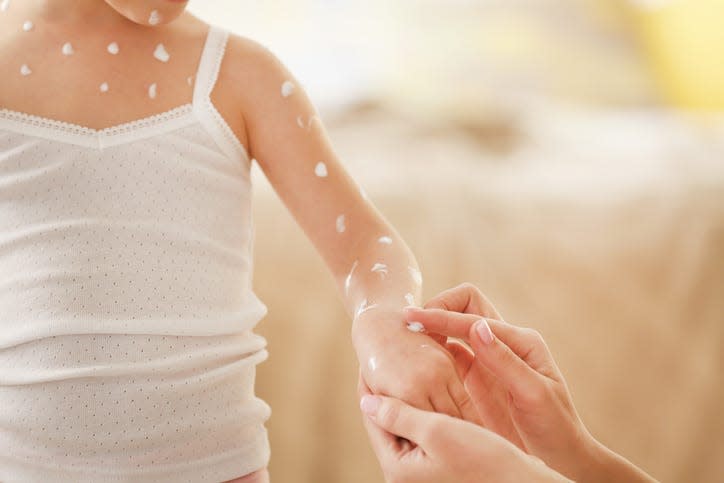
“When I went to medical school, they said: ‘Did you ever have a chickenpox shot?’ “And I was like, 'What? No.'” The varicella vaccine, which protects against chickenpox, wasn’t authorized in the U.S. until 1995, so she hadn’t been immunized.
Pruitt had a blood test to check for antibodies and was surprised to discover “I had immunity to chickenpox. I never had any fever or anything,” she said.
Boulton said a similar thing happened to him as well.
“I never had the hep A shot but I'm positive for hepatitis A antibodies,” he said. “So I clearly had this disease at one point.”
Does insurance cover the cost of a blood antibody test?
Not always.
It’s a good idea to check with your health insurance provider to find out what a blood test will cost to check for antibodies for vaccine-preventable diseases, said Dr. Mark Hamed, an emergency department physician at McKenzie Health System and medical director of rural health departments in eight Michigan counties — Huron, Lapeer, Sanilac, Tuscola, Alcona, Iosco, Ogemaw and Oscoda.
Depending on your coverage plan, “it can be expensive, very expensive,” Hamed said. If the blood test is too costly, sometimes physicians will recommend a dose of a vaccine to ensure you’re protected.
“Most of the vaccines are safe to get extra dose,” Hamed said. “So I'm telling people, if you're unsure (of your immunization status) and you have no way of finding out, get a booster or get a dose − whether it's a tetanus vaccine, whooping cough, pertussis, MMR,” which covers measles, mumps and rubella.
He especially recommends that approach if you’re someone who is around vulnerable people such as babies, elderly friends or relatives or people who are immunocompromised.
More:Schools have mandated vaccinations since the 1800s. Here's what happened in Michigan
Will the polio vaccine still protect me if my last dose was 40 or 50 years ago?
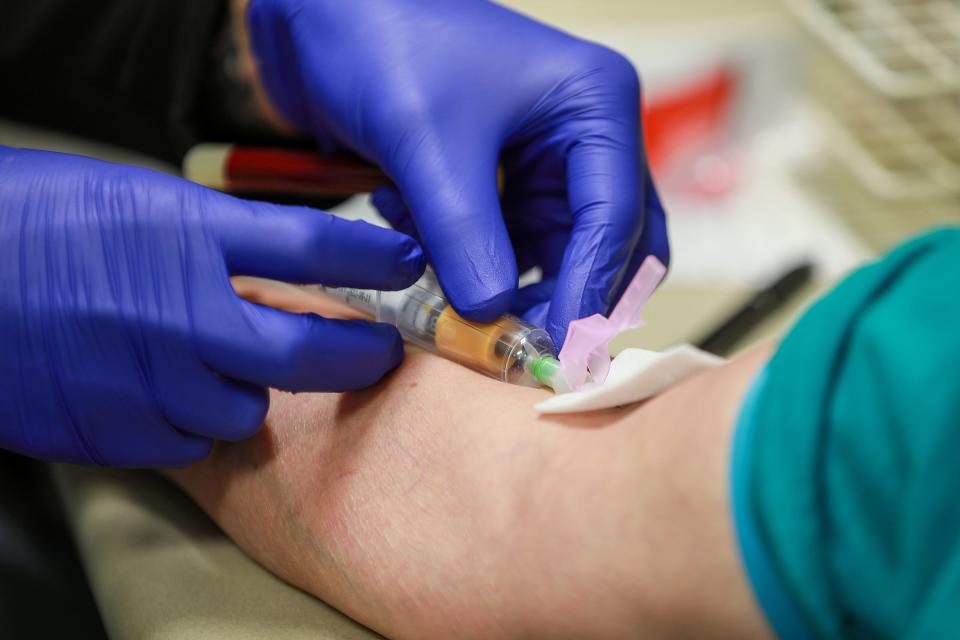
Yes, said Boulton. Whether you got the oral polio vaccine or the inactive polio vaccine (three primary doses with a fourth booster shot), you should remain protected.
Even though there’s evidence the virus is reemerging in New York state, health officials aren’t recommending another booster dose for anyone who has been fully vaccinated for polio.
“At some point, if there was to be widespread transmission … that might come into play,” Boulton said. “But we're not at that point at all.
“It's a dynamic situation, and if there was to be further spread, additional measures might be in order with regard to both ascertaining people's immune status, and or recommending a booster dose of the vaccine, but we're definitely not at that point yet.”
I didn’t get a lot of the vaccines that are now recommended for children. What should I do?
Several vaccines have been added to the U.S. Centers for Disease Control and Prevention’s childhood immunization schedule over the years, including those for chickenpox, rotavirus, human papillomavirus and hepatitis A.
Additionally, a CDC advisory panel recommended a second dose of the MMR vaccine in 1998 for children to be fully considered vaccinated. That means if you were born between 1957 through the late 1990s, you probably got only one dose.
The best thing to do, Boulton said, is talk to your doctor about whether it makes sense to get vaccinated now or get a booster.
Even though children now are routinely given the hepatitis A vaccine at birth, anyone born prior to the late 1990s in the U.S. probably didn’t get that immunization, either.
He recommends it for adults with preexisting liver disease, “especially from other forms of hepatitis. Other adults who may want to consider getting immunized are those who travel to parts of the world where hepatitis A infections are more common, he said.
More:Michigan wants kids caught up on vaccines after pandemic dip
More:Michigan kindergartners have higher rate of vaccine waivers than most states
Some of the recommended childhood immunizations are very age-specific, Boulton said.
“The rotavirus vaccine, which is for infant diarrhea, that's really only an issue in terms of severe illness, hospitalization or even death in very young children,” he said. “It's not recommended for adults because we don't see that as an important cause of illness or serious illness in even adolescents or adults. It’s very much a childhood vaccination.”
However, doctors now recommend adults get boosted with the diphtheria, tetanus and pertussis (whooping cough) vaccine, or TDaP, vaccine.
That’s because of a resurgence of whooping cough about 10 years ago in the U.S., and health officials discovered that the transmission was occurring from adults to children.
“So even though adults generally won’t experience serious disease or be hospitalized, they were back transmitting to infants and young children who do experience serious illness and hospitalization,” Boulton said. “Consequently, in an attempt to remove that reservoir, we now recommend that booster dose for adults for what was traditionally considered a childhood vaccine.”
Additionally, the HPV vaccine – recommended for children at 11-12 years old — can also be given to adults up to age 45 to prevent against genital warts and several types of cancer — cervical, vaginal, vulvar, penile and throat.
My parents refused vaccines when I was growing up. Is it too late for me to catch up now?
It’s not too late. Your doctor can work with you to catch you up on the recommended vaccines.
“If you're just turning 18, come get your shots,” Pruitt said. “A lot of kids may not realize they can make this decision now. They don't have to tell their parents they got the shots.
“They don't have to tell other people or ask for permission. … It's up to you and it’s your business as an adult you get to make those decisions.”
I had the smallpox vaccine in the 1960s. Am I protected from monkeypox?
“I think there is some level of protection,” said Boulton. “Because that is in the poxvirus family, and it's likely that there is some level of cross-protection that occurs there.”
It might limit its severity but may not be enough protection to prevent you from contracting the virus, he said.
That’s why the CDC recommends a dose of the Jynneos smallpox/monkeypox vaccine for anyone who hasn’t been vaccinated in the last three years and is at high risk for contracting the virus.
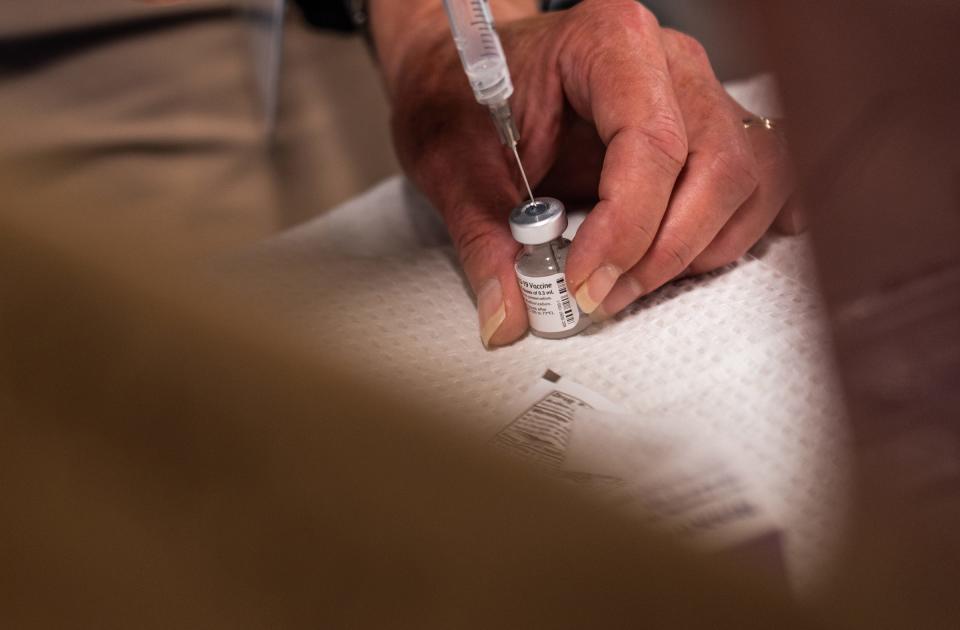
Should I bother getting vaccinated for COVID-19? So many people who are vaccinated are still getting the virus.
It’s important to stay up to date on COVID-19 vaccines and the recommended booster doses, too, Hamed said.
“I work in the ER, so I’m seeing COVID in front of me and how bad it can be,” he said. “Here's the truth about COVID: Yes, you can still get COVID if you are vaccinated. But the vast majority of people who being hospitalized are those who are unvaccinated.
“The vaccines don't protect you against getting it, but do protect you against getting severely ill.”
Boulton said the degree of vaccine hesitancy around COVID-19 vaccines was surprising to some, “but for those of us that have been working in this field for a lot of years pre-pandemic, vaccine hesitancy has been with us for a long time."
“One of the really important messages here is just to reiterate the importance of vaccines.
“The public health community and the medical community have been very successful in attaining really high levels of vaccination − to the point that many of these diseases, which were very common in our population at one time, have experienced greater than 99% reductions in occurrence. And that's all been based on population-level vaccination, and we can't forget that.
"I think it's gotten easier to forget that because people don't have experience with many of these diseases. They don't have personal experience, experiences through their family or through their friends. So these are unseen diseases for them.
“But they do represent a very real risk and you know, we are a global community now and the movement of people, animals and products is much more rapid around the world than it was at one time, and that would be true of pathogens as well, including vaccine-preventable diseases. So, it really is critical that we continue to maintain high levels of (vaccination) unless we want to return to those days, where these diseases exerted tremendous levels of morbidity and mortality in our population. That would certainly be true of polio.”
Contact Kristen Jordan Shamus: kshamus@freepress.com. Follow her on Twitter @kristenshamus.
This article originally appeared on Detroit Free Press: Polio virus: How to check vaccine, immunization records in Michigan

